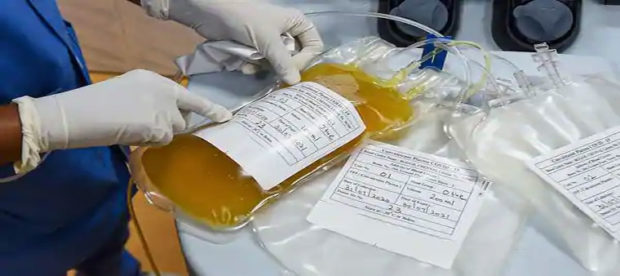
COVID-19: Experts caution against ‘irrational and non-scientific use’ of convalescent plasma
Team Udayavani, May 11, 2021, 4:03 PM IST

New Delhi: Some clinicians and scientists have written to Principal Scientific Advisor K Vijay Raghavan, cautioning against the “irrational and non-scientific use” of convalescent plasma for COVID-19 in the country.
The public health professionals said the current evidence on plasma therapy in COVID-19 and the Indian Council of Medical Research (ICMR) guidelines are not based on the existing evidence.
They also pointed out some very early evidence that indicates a possible association between emergence of variants with “lower susceptibility to neutralising antibodies in immunosuppressed” people given plasma therapy.
This raises the possibility of more virulent strains developing due to irrational use of plasma therapy which can fuel the pandemic, the letter signed by experts like vaccinologist Gagandeep Kang and surgeon Pramesh C S said.
“We are writing to you as concerned clinicians, public health professionals and scientists from India about the irrational and non-scientific use of convalescent plasma for COVID-19 in the country,” it said.
“This has stemmed from guidelines issued by government agencies, and we request your urgent intervention to address the issue which can prevent harassment of COVID-19 patients, their families, their clinicians and COVID-19 survivors,” said the letter which was also marked to Director General of the Indian Medical Council of India Balram Bhargav and AIIMS Director Randeep Guleria.
The concerns were raised after the Union Health Ministry last month issued an updated revised ‘Clinical Guidance for Management of Adult COVID-19 Patients’ under which it recommended off-label use of convalescent plasma only in the early moderate disease preferably within seven days of symptom onset.
It also stated that “no use after seven days” and only on availability of high titre donor plasma.
“The current research evidence unanimously indicates that there is no benefit offered by convalescent plasma for treatment of COVID-19. However, it continues to be prescribed rampantly in hospitals across India,” the letter said.
Families of patients run from pillar-to-post for getting plasma, which is in short supply. The desperation of patients and their families is understandable because they like to try the best for their loved ones, when a doctor has prescribed this, the public health professionals said.
In the plasma therapy, antibodies from the blood of a patient who has recovered from COVID-19 are used to treat serious patients.
They said the current evidence on plasma therapy in COVID-19 and the ICMR guidelines are not based on the existing evidence.
They cited the ICMR-PLACID trial which was the world’s first randomised controlled trial on convalescent plasma in 39 public and private hospitals across India.
It found “convalescent plasma was not associated with a reduction in progression to severe COVID-19 or all-cause mortality. This trial has high generalisability and approximates convalescent plasma use in real life settings with limited laboratory capacity”.
The large trial of 11,588 patients found no difference in death or proportion of patients discharged from hospital, the clinicians said.
Even for those patients who were not on ventilation initially, there was no difference “in the proportion meeting the composite endpoint of progression to invasive mechanical ventilation or death”, they pointed out.
The health professionals added that the PlasmAr trial, the trial from Argentina, concluded that there is no significant difference in “clinical status or overall mortality between patients treated with convalescent plasma and those who received placebo”.
“Current research evidence unanimously indicates that there is no benefit offered by convalescent plasma for treatment of COVID-19. However, it continues to be prescribed rampantly in hospitals across India,” they said.
“The problematic scenario arises because of guidelines issued by ICMR/AIIMS which currently recommends plasma therapy (April 2021 version) as ‘off label’ use. This is rather unusual as off-label use by its very definition implies ‘unapproved use’,” the letter said.
The letter added that guidelines from the National Institutes of Health (NIH) in the US and the Infectious Diseases Society of America (IDSA) also recommend against general use of plasma therapy for COVID-19.
Udayavani is now on Telegram. Click here to join our channel and stay updated with the latest news.
Top News

Related Articles More

Dedicated freight corridor is ‘jewel of Indian Railways’: Vaishnaw

ED seizes Rs 8.8 crore from corporate office of ‘lottery king’ Santiago Martin

Delhi CM Atishi announces staggered timings for government offices to tackle traffic congestion

Govt that does encounters doesn’t trust Constitution: Akhilesh Yadav

700 kg drugs seized, 8 Iranians caught in anti-narcotics operation along Gujarat coast
MUST WATCH
Latest Additions

Dedicated freight corridor is ‘jewel of Indian Railways’: Vaishnaw

ED seizes Rs 8.8 crore from corporate office of ‘lottery king’ Santiago Martin

Delhi CM Atishi announces staggered timings for government offices to tackle traffic congestion

India to clock 7.2 pc growth in 2024, RBI to hold interest rates steady this year: Moody’s

Govt that does encounters doesn’t trust Constitution: Akhilesh Yadav
Thanks for visiting Udayavani
You seem to have an Ad Blocker on.
To continue reading, please turn it off or whitelist Udayavani.






















